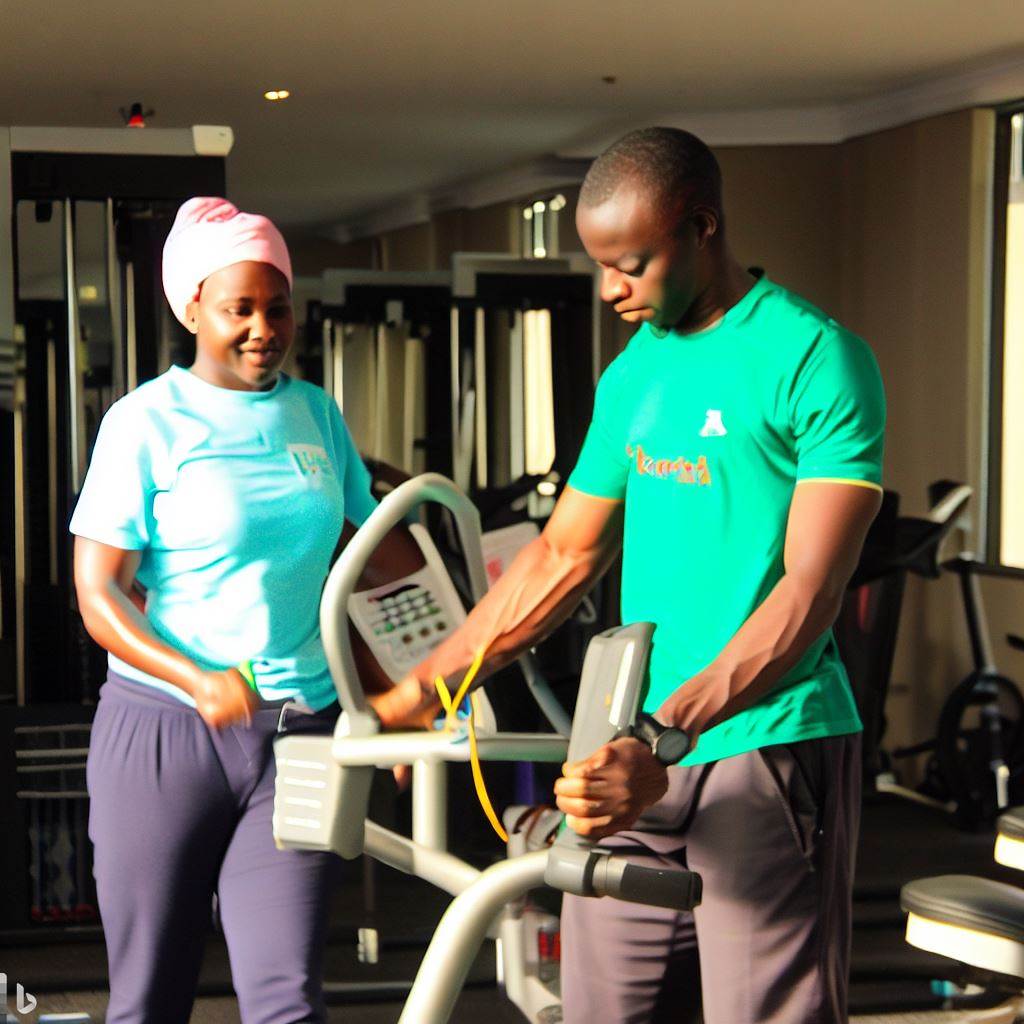Introduction
Exercise physiology is a discipline that studies how the body responds and adapts to physical activity and exercise. It focuses on the effects of exercise on the body’s systems, such as cardiovascular, respiratory, musculoskeletal, and metabolic.
Understanding these responses is crucial for designing effective exercise programs and improving overall health and performance.
The demand for exercise physiologists in Nigeria has been steadily increasing in recent years. This can be attributed to several factors.
Firstly, there is a growing awareness among the Nigerian population about the importance of physical activity and exercise for maintaining good health.
With rising instances of sedentary lifestyles and chronic diseases, such as obesity and diabetes, more people are seeking professional advice on how to improve their fitness levels and overall well-being.
Additionally, the Nigerian government has been actively promoting physical activity through various initiatives and campaigns. Recognizing the impact of exercise on public health, they have been encouraging individuals to engage in regular exercise and adopt healthier lifestyles.
This has created a greater demand for exercise physiologists who can provide expert guidance on safe and effective exercise practices.
Moreover, the sports industry in Nigeria has been growing rapidly, with increased participation in various sports at both the grassroots and professional levels. Exercise physiologists are crucial in enhancing athletic performance, preventing injuries, and optimizing training regimens.
As a result, there is a rising demand for these professionals within sports organizations, fitness centers, and athletic training facilities.
Basically, the demand for exercise physiologists in Nigeria is steadily increasing due to the growing awareness of the benefits of exercise, government initiatives promoting physical activity, and the expanding sports industry.
As more Nigerians recognize the value of exercise in maintaining good health and achieving peak performance, the need for qualified exercise physiologists will continue to rise.
What is Exercise Physiology?
Exercise physiology is the study of how the body responds and adapts to physical exercise. It involves understanding the physiological processes that occur during exercise and the effects on the body.
The scope of work in exercise physiology includes studying energy systems, cardiovascular and respiratory responses, and muscular adaptations. Exercise physiologists use this knowledge to develop exercise programs for individuals and athletes.
Role of Exercise Physiologists in Promoting Health and Wellness
Exercise physiologists play a crucial role in promoting physical activity for overall health. They assess individuals’ fitness levels, recommend appropriate exercises, and guide them toward achieving goals.
Additionally, they educate on the benefits of exercise in maintaining weight, reducing the risk of chronic diseases, and improving mental health. Exercise physiologists also monitor progress and make adjustments to workout plans for optimal results.
Importance of exercise physiology in improving performance and preventing injuries
Exercise physiologists help athletes enhance their performance through tailored training programs. They analyze physiological responses to exercise and design strategies to improve endurance, strength, and speed.
By understanding biomechanics, exercise physiologists can prevent injuries and dysfunctional movement patterns. They also provide guidance on proper warm-up techniques, injury prevention exercises, and recovery strategies.
Exercise physiology is a vital field that contributes to the overall well-being of individuals and athletes. By studying and understanding the body’s responses to exercise, exercise physiologists can design effective workout plans for specific goals.
Their role in promoting physical activity and educating individuals on the benefits of exercise is crucial in improving public health.
Furthermore, exercise physiologists play a significant role in enhancing athletic performance by focusing on optimizing training methods. Their ability to prevent injuries and provide guidance on movement patterns is invaluable in sports and exercise settings.
Overall, the demand for exercise physiologists in Nigeria is expected to increase as more individuals recognize the importance of exercise in maintaining a healthy lifestyle.
Increasing Awareness of Health and Fitness
Rising concern for non-communicable diseases (NCDs) in Nigeria
Non-communicable diseases (NCDs), such as heart disease and diabetes, are on the rise in Nigeria. The increasing prevalence of NCDs has raised concerns about the overall health of the population.
Sadly, sedentary lifestyles, unhealthy diets, and lack of physical activity contribute to the development of NCDs. The demand for exercise physiologists has grown as a result of the need to prevent and manage NCDs.
Government and private sector efforts to promote health and fitness
The Nigerian government has recognized the importance of promoting health and fitness among its citizens. Initiatives such as the National Physical Activity Guidelines have been introduced to encourage physical activity.
The government has also partnered with private sector organizations to implement programs aimed at improving health and fitness. These efforts have led to an increased demand for exercise physiologists who can support these initiatives.
Influence of media and social platforms on health consciousness
The rise of media and social platforms has had a significant impact on health consciousness in Nigeria. People are exposed to more information about the importance of maintaining a healthy lifestyle.
Additionally, social media platforms allow individuals to share their fitness journeys, which inspires and motivates others. The growing awareness of the benefits of exercise and healthy living has created a demand for exercise physiologists
Therefore, the demand for exercise physiologists in Nigeria is on the rise due to increasing awareness of health and fitness.
The prevalence of non-communicable diseases, government and private sector efforts to promote health, and the influence of media and social platforms have all contributed to this demand.
As Nigerians become more conscious of their health, the role of exercise physiologists becomes crucial in helping individuals prevent and manage non-communicable diseases.
Read: The Role of Exercise Physiology in Nigeria’s Sports Industry
Growing Fitness Industry in Nigeria
The fitness industry in Nigeria has been experiencing significant growth in recent years. This can be attributed to several factors, including the rise in fitness centers, gyms, and wellness facilities.
Rise in fitness centers, gyms, and wellness facilities
Nigeria has seen a surge in the number of fitness centers, gyms, and wellness facilities being established across the country.
These establishments cater to a diverse range of people, from fitness enthusiasts to individuals looking to improve their overall health and well-being.
The demand for exercise physiologists has also increased as a result of this trend. The growth in fitness centers, gyms, and wellness facilities can be attributed to various factors.
Firstly, there is a growing awareness and emphasis on the importance of maintaining a healthy lifestyle and regular exercise. The Nigerian population is becoming more health-conscious, leading to an increased demand for fitness facilities.
Furthermore, the middle class in Nigeria has been expanding, resulting in increased disposable income. This has allowed individuals to prioritize their physical well-being and invest in fitness memberships.
The rise in urbanization and Western influences has also played a role in promoting fitness culture, as more people are exposed to the benefits of regular exercise.
Emergence of personal trainers and fitness coaches
Alongside the growth of fitness centers, there has been a noticeable emergence of personal trainers and fitness coaches in Nigeria. These professionals provide personalized training sessions and guidance to individuals based on their specific fitness goals.
Personal trainers and fitness coaches have become highly sought after in Nigeria, as they offer a more personalized approach to fitness.
They work closely with clients to develop tailored exercise programs and provide continuous support and motivation. This individualized attention has proven to be highly effective in achieving desired fitness outcomes.
Integration of technology in fitness tracking and monitoring
Another significant development in the Nigerian fitness industry is the integration of technology in fitness tracking and monitoring.
Fitness enthusiasts and individuals seeking to improve their health now have access to a variety of technological tools and devices that help them track their progress and monitor their fitness levels.
For instance, there has been an increase in the use of fitness-tracking apps and wearable devices such as smartwatches and fitness bands. These devices can monitor heart rate, track steps taken, and even provide personalized feedback and suggestions for improvement.
Technology integration has made it easier for individuals to stay motivated and track their fitness journey. In fact, the fitness industry in Nigeria is experiencing significant growth, and this trend is not expected to slow down.
The rise in fitness centers, gyms, and wellness facilities, along with the emergence of personal trainers and fitness coaches, has created a demand for exercise physiologists in the country.
Additionally, the integration of technology in fitness tracking and monitoring has further enhanced the fitness experience for individuals. As Nigeria continues to prioritize health and well-being, the demand for exercise physiologists is expected to increase significantly in the coming years.
Read: A Day in the Life of a Diagnostic Medical Sonographer in Nigeria

Demand in Sports and Athletics
Expanding professional sports leagues and teams
With the increasing popularity of sports in Nigeria, professional sports leagues and teams are experiencing significant growth. The demand for exercise physiologists is rising as these sports leagues, and teams strive for better performance and injury prevention.
Exercise physiologists are vital in helping athletes optimize their physical fitness, endurance, and overall well-being. As more sports leagues and teams emerge in Nigeria, the demand for exercise physiologists continues to expand.
Sports science and performance enhancement in Nigeria
The field of sports science and performance enhancement is gaining recognition and importance in Nigeria. Exercise physiologists play a crucial role in this field by utilizing scientific principles to improve athletes’ performance.
They analyze physiological data to develop individualized training programs, considering factors such as nutrition, exercise, and recovery. Exercise physiologists support athletes, helping them achieve their goals and excel in their respective sports.
Collaboration between exercise physiologists and sports teams
Collaboration between exercise physiologists and sports teams is becoming increasingly common in Nigeria.
Exercise physiologists work closely with coaches, trainers, and athletes to optimize training methods and injury prevention strategies. By understanding the specific physiological demands of different sports, exercise physiologists can tailor programs to meet athletes’ needs.
They provide valuable insights into athletes’ performances, helping teams make informed decisions for training and performance enhancement.
Furthermore, exercise physiologists play a crucial role in injury rehabilitation, assisting athletes in returning to their sport safely and effectively.
In general, the demand for exercise physiologists in sports and athletics in Nigeria is on the rise. With the expansion of professional sports leagues and teams, the importance of sports science and performance enhancement is increasing.
Collaboration between exercise physiologists and sports teams further strengthens the support provided to athletes. As Nigeria continues to prioritize sports and invest in its development, the demand for exercise physiologists will continue to grow.
Read: The Impact of Sonography on Nigeria’s Healthcare System
Healthcare Sector and Rehabilitation
The healthcare sector in Nigeria plays a crucial role in the overall well-being of the population.
While doctors, nurses, and other healthcare professionals play vital roles in diagnosis and treatment, exercise physiologists have a specific role in enhancing patient outcomes and promoting overall health.
Here, we will explore the importance of exercise physiologists in medical settings and rehabilitation programs, as well as their role in chronic disease management.
Role of exercise physiologists in medical settings
Exercise physiologists are highly trained professionals who specialize in understanding the effects of exercise on the human body.
In medical settings, they play a crucial role in developing exercise programs tailored to the specific needs of patients, based on their medical conditions, physical abilities, and rehabilitation goals. They work closely with other healthcare professionals to ensure a holistic approach to patient care.
Exercise physiologists assess patients’ physical abilities, mobility, and overall fitness levels to design exercise programs that promote healing, improve cardiovascular health, and enhance overall well-being.
They monitor patients during exercise sessions, making adjustments as necessary to ensure safety and maximize health benefits.
Rehabilitation programs and physical therapy centers
Rehabilitation programs and physical therapy centers also rely heavily on exercise physiologists. These professionals play a key role in helping patients recover from injuries, surgeries, or various medical conditions.
They design personalized exercise programs that aid in the rehabilitation process, promoting healing, strength building, and functional improvement.
Exercise physiologists work closely with physical therapists and other rehabilitation professionals to create comprehensive treatment plans for patients. By carefully designing exercise programs that target specific areas of the body, they can expedite the healing process and improve patients’ overall quality of life.
Importance of exercise physiology in chronic disease management
Exercise physiology is particularly important in the management of chronic diseases such as diabetes, cardiovascular disorders, and respiratory conditions.
Regular exercise has been shown to have numerous benefits in managing chronic diseases. Exercise physiologists play a crucial role in developing and implementing exercise programs that help patients manage their conditions, reduce symptoms, and improve overall health.
Exercise physiologists tailor exercise programs to meet the specific needs of individuals with chronic diseases, considering factors such as their current health status, limitations, and personal goals.
By incorporating exercise into their daily routines, patients can experience improved cardiovascular fitness, better blood sugar control, enhanced lung function, and increased overall endurance.
In short, exercise physiologists play a vital role in the healthcare sector and rehabilitation programs in Nigeria. Their expertise in exercise science contributes to improved patient outcomes, faster recovery, and overall well-being.
In medical settings, they design personalized exercise programs to aid in rehabilitation, while in chronic disease management, they develop exercise routines to alleviate symptoms and promote long-term health. Their presence in the healthcare system is crucial for delivering holistic and effective patient care.
Read: Impact of Exercise Physiologists on Nigerian Healthcare
Academic and Career Opportunities
Availability of exercise physiology programs in Nigerian universities
In recent years, Nigerian universities have recognized the importance of exercise physiology and have introduced programs to meet the growing demand.
Several universities now offer undergraduate and postgraduate degrees in exercise physiology.
These programs provide students with a comprehensive understanding of the human body’s response to exercise, enabling them to work effectively with athletes, patients recovering from injuries, and individuals looking to improve their overall fitness.
The availability of such programs has made it convenient for students across Nigeria to pursue a career in exercise physiology without the need to travel abroad for education.
Increasing interest in pursuing a career as an exercise physiologist
There has been a noticeable increase in the number of students opting for exercise physiology as their preferred field of study. This trend can be attributed to the growing awareness of the importance of physical fitness and its impact on overall health.
Moreover, the inspiring success stories of exercise physiologists who have achieved remarkable results in improving athletes’ performance have also played a significant role in attracting students to this field.
Many young Nigerians aspire to become exercise physiologists to not only make a difference in people’s lives but also contribute to the advancement of sports science in Nigeria.
Job prospects and potential income in the field
As the demand for exercise physiologists continues to rise in Nigeria, so do the job prospects in this field.
Exercise physiologists have diverse employment opportunities, including working in sports clubs, fitness centers, rehabilitation centers, and research institutions.
The potential income of exercise physiologists in Nigeria is also quite promising. Depending on their qualifications, experience, and specialization, exercise physiologists can earn competitive salaries.
Their income can further be supplemented by offering private consultations, developing personalized fitness programs, or conducting research studies. This provides them with the opportunity to both help individuals achieve their fitness goals and increase their earnings.
Generally, the field of exercise physiology in Nigeria is witnessing significant growth in terms of academic and career opportunities.
With the availability of specialized programs in Nigerian universities, a surge in students’ interest, and promising job prospects, the future looks bright for aspiring exercise physiologists in Nigeria.
Read: The Evolving Role of Medical Sonographers in Nigeria
Challenges and Future Perspectives
Limited awareness of exercise physiology as a profession
Many Nigerians are unaware of the profession of exercise physiology. This lack of awareness hinders the demand and recognition of exercise physiologists.
Hence, efforts should be made to educate the public about the role and benefits of exercise physiology. For example, awareness programs, workshops, and campaigns can help create a better understanding of this profession.
Collaboration with healthcare institutions and fitness centers can also increase awareness and demand.
Need for more research and evidence-based practices
The field of exercise physiology in Nigeria lacks extensive research and evidence-based practices. More studies and research projects should be conducted to establish the effectiveness of exercise interventions.
Evidence-based practices will strengthen the credibility of exercise physiologists and their profession. This will encourage more individuals and organizations to seek their services and expertise.
Furthermore, institutional support and funding are essential to promote research in exercise physiology.
Potential growth and opportunities for exercise physiologists in Nigeria
The future of exercise physiology in Nigeria is promising, with the potential for significant growth. The increasing need for preventive healthcare and wellness programs creates opportunities for exercise physiologists.
Government initiatives promoting physical activity and healthy lifestyles also contribute to the demand for these professionals. This is because exercise physiologists can play a vital role in designing and implementing exercise programs for various target populations.
Opportunities in sports performance enhancement, rehabilitation, and corporate wellness programs are also expanding. Collaboration with healthcare professionals and policymakers can further enhance the recognition and utilization of exercise physiologists.
Additionally, continuing education and professional development will be crucial to meet the evolving needs of the profession. Networking and professional associations can provide support and create a platform to address challenges and share knowledge.
Overall, the demand for exercise physiologists is expected to rise, providing a bright outlook for the profession in Nigeria.
In a nutshell, while challenges persist, such as limited awareness of exercise physiology as a profession and the need for more research, the future perspectives for exercise physiologists in Nigeria are positive.
Efforts should be made to increase public awareness, conduct research, and promote evidence-based practices. The potential growth and opportunities in preventive healthcare, sports performance, rehabilitation, and corporate wellness create a promising scenario for the profession.
Collaboration, continuing education, and professional development will further enhance the recognition and demand for exercise physiologists in Nigeria.
Conclusion
Exercise physiologists play a crucial role in improving the overall health and well-being of individuals in Nigeria. Throughout this blog, we have highlighted the demand for exercise physiologists in Nigeria and the reasons behind it.
It is clear that exercise physiologists are needed to address the rising health concerns and promote a more active lifestyle. By focusing on preventive measures, exercise physiologists can help reduce the burden on the healthcare system and improve the quality of life for Nigerians.
In conclusion, exercise physiologists are essential in addressing the health challenges faced by Nigerians and should be recognized for their valuable contributions. We urge policymakers and healthcare professionals to prioritize the integration of exercise physiologists into healthcare systems across Nigeria.
By doing so, we can work towards a healthier nation and ensure that individuals have access to the necessary support and expertise to lead an active lifestyle. Together, let us invest in the future of healthcare in Nigeria by recognizing and supporting the demand for exercise physiologists.




